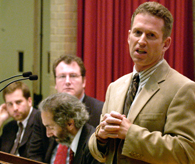One of the most important Supreme Court decisions in history, Brown v. Board of Education celebrated its 50th anniversary last May.
Wednesday, the Arts and Sciences forum presented a lecture, “Mythmaker Mythmaker, Make me a Myth: Brown and the Creation of American Ideology” to reflect upon repercussions this ruling has had.
Though the panel members had different opinions throughout the forum, they all agreed in conclusion that all people make changes every day, and that they can collectively make a difference.
Gerald Rosenberg of the University of Chicago discussed ideas from his book “The Hollow Hope: Can Courts Bring About Social Change?” Rosenberg said that there are direct as well as indirect effects that stem from the Brown decision, and he questioned what Brown accomplished. Data shown by Rosenberg revealed that 10 years after Brown, there was one African American student to every 100 white students in previously white schools.
The Brown decision is said by some to have sparked the civil rights movement. Rosenberg does not agree with this theory, and he pointed out that there was about 10 years between the two movements.
“During this time, political and social forces did not support the Supreme Court decision, and the Supreme Court alone lacked the power to change practices,” Rosenberg said.
According to Rosenberg, Congress did not support the effort, and President Dwight D. Eisenhower never publicly endorsed the Brown decision. It was not until federal dollars started pouring in that change started to occur in the South.
Rosenberg said that the Brown decision is essentially irrelevant and that it should be looked upon as a symbol. True change, according to Rosenberg, occurred with the Montgomery Bus Boycott, the inspirations of Martin Luther King Jr. and the African Liberation Movements.
John Borkowski, an attorney with Hogan and Harston, defended the court rulings’ relevance. In fact, he said that he is a product of Brown v. Board of Education.
Borkowski recalled that as a fourth grader, he was afraid to play in a basketball tournament with an all-black school. But with the upward trend in integrating schools in the 1960s and 1970s, Borkowski attended an integrated church and began to play at inner city playgrounds. He said Brown helped him to become the person he is today.
However, Peter Burns, associate professor of political science, called Rosenberg’s book a “first-rate piece of knowledge.”
Anita Oubre can be reached at amoubre@loyno.edu.






